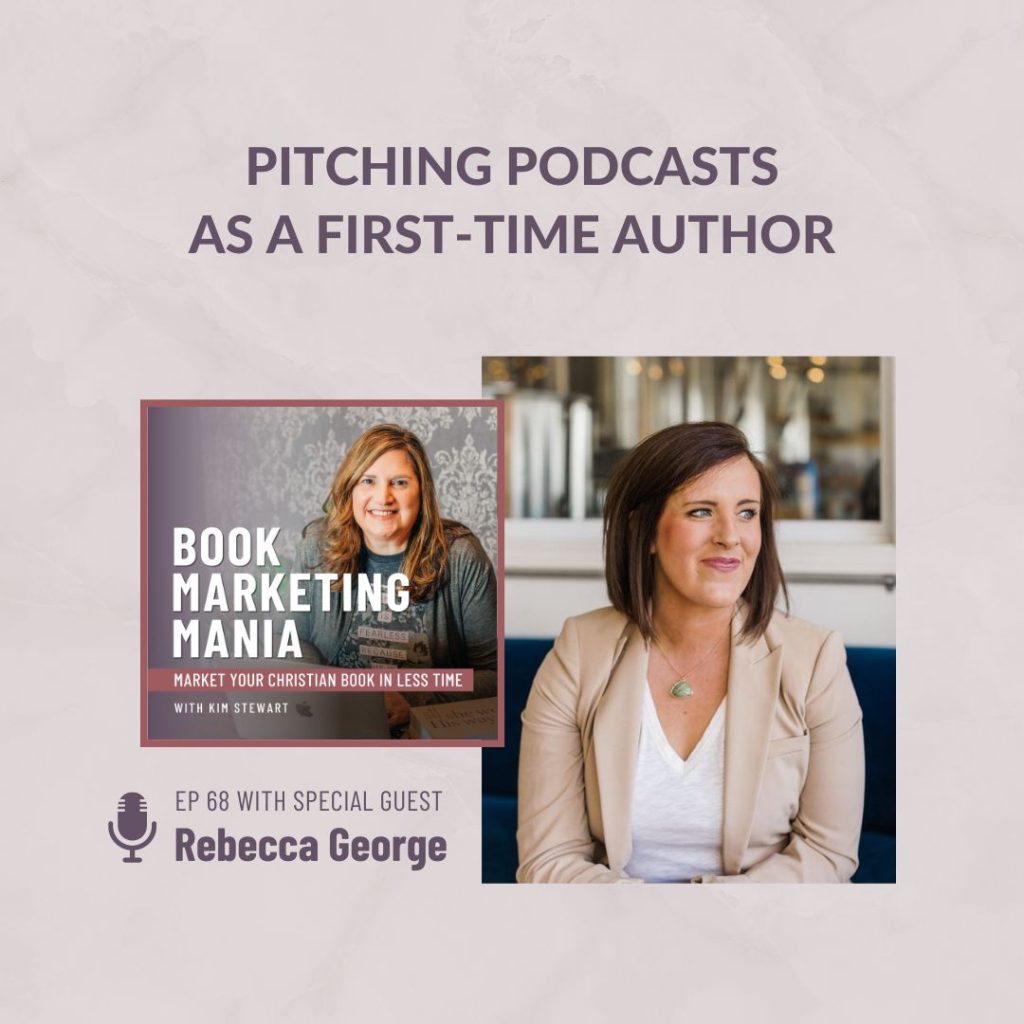Pitching Podcasts as a First-Time Author
Launching your book as a first-time author?
You might be wondering how soon to start pitching podcasts, what to include in your pitch, and how to manage the process.
First-time author Rebecca George is back to take us behind the scenes of her book launch, pitching podcasts long before her traditional publisher's PR started, and what she likes to see in a pitch herself as the host of the Radical Radiance podcast.
Apple / spotify / YOUTUBE
This post may contain affiliate links. Read my disclosure policy here.
Start Marketing Earlier Than You Think
One of the standout moments in our conversation was when Rebecca spoke about the timeline of her book promotion. Imagine this: Rebecca got her book deal and, almost immediately, shared the news with her community on social media. She even included the release date in her Instagram profile long before the book was out.
Rebecca's approach was strategic. She knew that building anticipation and engaging her audience early on was crucial. As she put it, “You've got to start telling people early because we all get stuck thinking we only need to focus on book marketing right before the launch.” This early promotion strategy not only kept her followers excited but also brought them along on her journey, making them feel involved and invested in her success.
The Personalized Podcast Pitch
One of the aspects I absolutely loved about Rebecca's pitching strategy was her level of personalization. When she reached out to me five months before her book release, her pitch wasn't just a generic email. Instead, it was tailored specifically for my podcast. Rebecca took the time to understand my audience and meticulously crafted a message outlining how her insights would benefit my listeners.
This level of personalization not only impressed me but also made it clear that she valued my platform. Rebecca emphasized the importance of making your pitch stand out by saying, “It was totally for your show, Kim. You couldn't have pitched that to anyone else.” That’s a golden nugget for anyone looking to pitch themselves to podcasts: show the host that you’ve done your homework and explain exactly how you can add value to their audience.
Pitch Early, Book Early
Rebecca's foresight in pitching her book early was not just limited to me. She started reaching out to podcasts even before her PR firm jumped into action.
“Most times, if your publisher hires outside publicity, you're talking a couple months, two to three months, maybe before your launch, maybe a month or two, if you're lucky, after your launch. I just didn't want to sit around on my hands and wait for that to start.”
For those wondering how to achieve this, Rebecca suggested, “By the time I started working with a publicist, I had booked about 40 shows myself, and then they were able to come in and complement what I was already doing.”
This proactive approach offers a dual benefit: it not only secures early spots but also allows publicists to focus on additional opportunities, rather than scrambling to catch up.
Building Relationships with Podcast Hosts
Speaking of pitching early, some of you might wonder how to pitch your book if you don't yet have a physical copy in hand. Rebecca nailed this by adopting a humble and flexible approach. She often used phrases like, “I just want to go ahead and put this on your radar,” making it clear that although the book wasn't ready yet, it was something worth considering for future episodes.
She also offered to send a PDF or a watermarked manuscript once it was available. This approach respects the host's time constraints while keeping your book in their consideration set. Rebecca’s pro tip: “It's all in the way that you word it and also offering to follow up when you have more to share.”
Mastering Your Media Kit
If there's one thing Rebecca couldn't stress enough, it's the value of a well-prepared media kit. “I love to see a good media kit,” she mentioned, emphasizing its importance regardless of your publishing path. A media kit typically includes your bio, the book's topics, sample questions, and insights about your unique angle.
Rebecca noted, “No matter which path to publishing you're taking, you're likely thinking about how to share your message in a way that maybe hasn't been done before.” Incorporating a unique perspective or a fresh angle not only grabs the host's attention but also sets you apart from other guests.
Systems for Staying Organized
Let's talk systems! Rebecca shared how she stays on top of her podcast pitching with a simple but effective method: Google Sheets. It's my fave too!
This allows her to keep track of the shows she's pitched, their statuses, and important dates. The flexibility of Google Sheets means she can update her list on the go, ensuring she never misses an opportunity.
Not tracking your progress? Fix that common podcast pitching mistake.
This system helps Rebecca stay organized and motivated. Seeing the numbers—how many pitches sent, how many accepted, and how many recorded—provides her with a tangible sense of progress, making the entire process less overwhelming.
📚 RESOURCES MENTIONED 📚
Episode 67: The Tension of Time When Launching Your Book with Rebecca George
Do the Thing: Gospel-Centered Goals, Gumption, and Grace for the Go-Getter Girl by Rebecca George
Rebecca's Website
Rebecca's Instagram
🎙 RELATED EPISODES 🎙
🎧 Create your podcast pitching strategy (#32)
🎧 Get your home base ready before pitching (#47)
🎧 7 Ways to Share Your Interviews as a Podcast Guest (#51)

Kim Stewart is a book marketing strategist for nonfiction authors and host of the Book Marketing Mania podcast. She helps you reach more readers as a podcast host and guest. When she’s not strategizing with clients or binge listening to podcasts, you’ll find her enjoying family time and indulging in coffee, caramel and Friends reruns.






